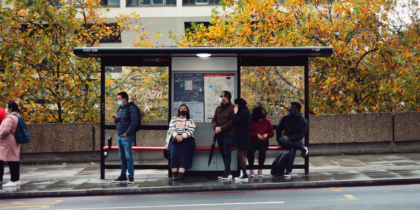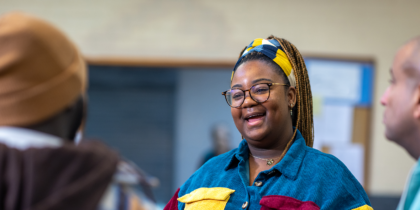For the public health team in Sandwell, it was crucial that the projects funded through the Better Mental Health Fund aligned with their overall strategic ambitions for the health of local people, especially those who live in poverty, including their targets of achieving zero suicides.
The programme in Sandwell was also determined by local commitments to building on existing community assets, as well as engaging local people and coproducing solutions. ‘We work with local people’, said one interviewee. ‘We don’t do things to them’.
There had been long term aspirations to develop capacity to improve mental health and wellbeing locally, but few resources available with which to do it. The Better Mental Health Fund offered opportunities to work in new ways, moving away from a medical model, into one which focused on building social capital and community assets. The voluntary and community sector was crucial in achieving these goals because of their connectedness with local people and their deep understanding of the histories and cultures of local communities.
How was the Better Mental Health Fund used?
The programme in Sandwell focused on the needs of children and families.
The programme aimed to:
- Deliver interventions to improve mental wellbeing among Sandwell residents of all ages, with a particular focus on groups at increased risk of poor mental health
- Improve understanding of mental health and wellbeing among Sandwell’s communities, including available support
- Increase capacity among voluntary and community sector organisations supporting mental wellbeing.
The projects included:
- Changes Parenting support project
- Activities for new and expectant parents
- Library project
- Project Training Module – anti bullying
- Voluntary and Community Sector Charter Mark
- Project E – Team Talk
- Tough Enough to Care
- for All – Inspiring Positive Minds
- Mental Health Literacy Tutor Training
- Mental Health Champions
- Kaleidoscope Plus Group Training
Small grants scheme
In addition to the funded projects, Public Health in Sandwell set up a small grants scheme which gave small community groups, which lacked the capacity or expertise to apply for large pots of money, up to five £5,000 to undertake small interventions, pilot ideas, or give taster sessions. Funded activities included ones which focused on growing, cooking and eating food together. As one interviewee noted, ‘the funding created new avenues, new projects, new groups’. The key learning from the small grants scheme was that small amounts of money could have big impact on local people who otherwise wouldn’t access mainstream services. They were useful in building the appetite of small community groups to be ambitious in the future in terms of improving mental health and wellbeing. ‘These small organisations have a lot to offer’, said one interviewee, ‘they have great potential’
Impacts on local people
Sandwell set a goal of reaching 9,504 beneficiaries and recorded 1,450.
In Sandwell, 75% of people live in in the 30% most deprived in England and they accounted for 69% of the reach – a success in terms of reaching people in greatest socio-economic need for whom a longer period might be necessary to secure engagement. Overall, the proportion of people engaged in the projects from racialised communities was reflective of the general population.
Of those beneficiaries for whom we know their age, 64% were aged between 26-64 and 20% were aged 18-25 – this shows a concentration of effort, and effective engagement, of people of working age.
What have we learnt?
In Sandwell, the Better Mental Health Fund created opportunities to showcase what can be done in the mental health promotion space – a legacy which will hopefully encourage future investment. It also enthused local organisations to think about how they can incorporate mental health and wellbeing outcomes into their work in the future.
The concertinaed timeframe created challenges further down the line. Recruiting staff during a pandemic was beset with problems as colleagues who would usually have been interested in a short-term secondment were redeployed elsewhere. The programme manager they recruited brought immediate benefit to the process, creating extra capacity to ensure that the projects were supported to deliver.
Having created such an impact and whetted the appetite for mental health related activities for so many, colleagues in Sandwell were concerned about how projects would be sustained. One interviewee said the impact was going to be difficult for local partnerships to manage and would have ‘a devastating impact’ on local organisations. They commented, ‘things come along, twelve months, then they’re gone. How can we have a long-term impact if there’s no more investment?’
Local evaluation
The local evaluation of the programme concluded:
‘the projects within the Better Mental Health Programme have been well received. They have received positive feedback, provided support to individuals and helped to promote wider wellbeing. There has been an emphasis on partnership working throughout, ensuring the projects are as accessible as possible and a constant strive for change and improvement.
Despite this, several challenges were presented. The largest being COVID and its impact on services, safety and planning. In addition to this, there were numerous barriers to access including attendance, marketing and high demand for services.
Overall, the response towards the projects was overwhelmingly positive. All projects demonstrated a plan to continue and expand the services they offer. There has been a focus on sustainability of the projects and putting them in the hands of the voluntary and community sectors’.



